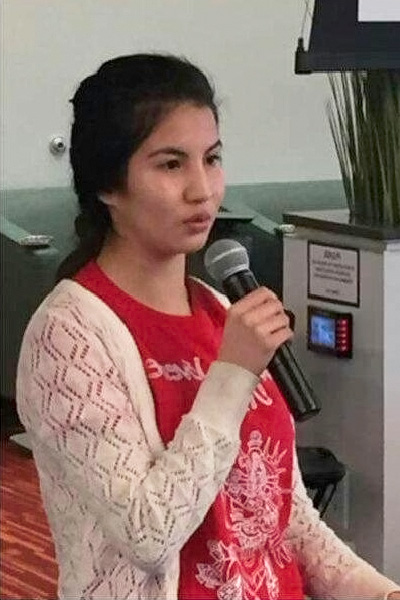
Keri Smith / Padres & Jõvenes Unidos
Patricia Cardenas, a student leader working with Padres & Jõvenes Unidos, informs students on how to expunge disciplinary records before they apply to college.
In the push to get schools to stop releasing high school disciplinary records to colleges as part of the college admissions process, a Denver-based nonprofit called Padres & Jõvenes Unidos is on the front lines.
The organization, whose name is Spanish for Parents and Youths United, has launched a “know your rights” campaign to inform parents and young people about the fact that they can petition the Denver public school system to get students’ high school disciplinary records expunged. The idea is to remove anything that might hurt their efforts to get accepted into college.
“Don’t let your discipline record DAMAGE your life opportunities,” declares a flier from Padres & Jõvenes Unidos. “EXPUNGE records before applying to college or other key decisions.”
But expunging school disciplinary files is not an easy process, according to Patricia Cardenas, a 16-year-old student leader who is helping lead the campaign.
“To get something off your school record, your parent has to request it and you have to do this whole process as to why they want to take it off,” Cardenas said. “Then there’s a lot of meetings. You have to fight your case. It’s a long, long process. No one wants to go through with it because it’s so difficult.”
But it could soon become easier.
With the help of the Advancement Project, a civil rights organization based in Washington, D.C., Padres & Jõvenes Unidos is trying to persuade Denver Public Schools administrators to adopt a policy that would automatically purge students’ disciplinary records on an annual basis. They also want the school district to create and publicize a way for parents to seek the removal of discipline records that are less than a year old in order to prevent the records from hurting children’s college applications.
Denver Public Schools leaders say they are open to the idea.
“Right now, district policy does not prevent counselors from answering these college admission questions, but we are in the early stages of engaging with community partners to discuss whether or not that should change,” said Doug Schepman, a spokesman for the Denver Public Schools.
Daniel Kim, director of youth organizing at Padres & Jõvenes, said the practice of releasing student disciplinary records should end because it has a disparate impact on students of color.
“We see this as part of the school-to-prison pipeline, part of the way that students of color and communities of color are denied equal rights to education,” Kim said. “The system is set up to punish students of color and then they don’t realize” that their records follow them.
Cardenas got a firsthand glimpse at the issue when she got access to her own school disciplinary file from middle school after she started working as a student leader for Padres & Jõvenes.
“When I started, [Padres & Jõvenes] obviously wanted me to be well informed of what was on my record,” Cardenas said. “We checked and found out I had a few discipline things in middle school because in middle school, I wasn’t the best student, and I know that.”
But upon examining her disciplinary record, she said, it seemed as if she had some sort of write-up “for every little thing.”
“I had some for disrupting the class, talking back to the teacher, for anything really that you have to deal with the administrator ...” Cardenas said.
“But I feel like they were put down wrongly,” she said. “Some of these things could have been addressed a different way. ... It makes me seem like I don’t know how to cooperate or I can’t listen or can’t communicate.”
Don't miss feature article "About Half of High Schools Release Discipline Records to Colleges for Admissions"